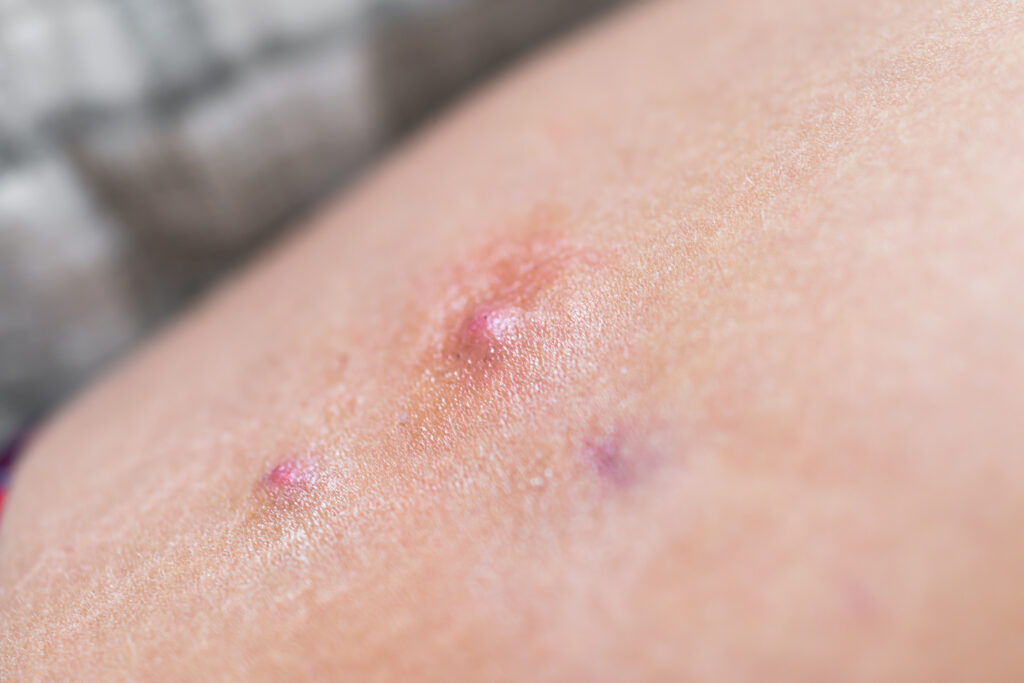
A dermatologist can create a treatment plan to relieve symptoms and prevent further damage. Treatment may include surgically removing the areas that are most prone to painful boils.
HS is a chronic condition, and people with HS often have periods of improvement or worsening. There's no cure, but medications and treatment can help manage the condition.
Symptoms
HS usually affects areas of the body that have hair or sweat glands, such as the armpits, groin and anus, thighs, breasts, and buttocks. These areas can be sore or painful, especially when a boil develops. These are pus-filled pockets under the skin. They break open or drain, and then they form scars. Sometimes a person can have many boils at once.
Doctors often diagnose hidradenitis suppurativa with a history and physical exam. They may also evaluate for conditions that can be coexisting, such as metabolic syndrome, inflammatory bowel disease and spondyloarthropathy (a condition that causes pain in the joints).
Treatment can help reduce the number of flare-ups and improve quality of life. A person with HS can have a variety of treatments, including antibiotics (to kill bacteria) and anti-inflammatory medications, such as corticosteroids. Antiseptic washes, such as 4% chlorhexidine, and antimicrobial creams are often used. Doctors can also prescribe a type of medicine that treats diabetes called metformin off-label to improve hidradenitis suppurativa in some people. They can also prescribe retinoids, drugs that are derived from vitamin A, to treat hidradenitis suppurativa.
Diagnosis
Many people with HS feel embarrassed about leaking, pus-filled pockets. But if you get early treatment, it can reduce scarring and lessen flare-ups.
Typically, doctors can diagnose HS based on your oral history and a visual inspection of the affected areas. The way the outbreaks look different from boils or acne and occur in areas with more sweat glands or where skin rubs together help distinguish them as HS.
It's also important to know that HS isn't caused by an infection or sexually transmitted disease (STD), and it doesn't result from poor hygiene. Instead, the condition is a form of autoinflammatory disease that affects hair follicles and causes chronic inflammation.
If a swollen area becomes infected, use antibiotic ointment or liquid bandage over the bump. You may need to swab the sore if it leaks. If left untreated, the inflammation can damage nearby organs and lead to anemia. A health care team that includes a dermatologist or a primary care doctor can help you manage your symptoms and avoid complications.
Treatment
The cause of HS isn't clear, but it likely involves a combination of factors. It's more common in women than men, and it can run in families. It may be triggered by obesity and smoking. And it's more common in people who've had severe acne in the past. HS can also cause a lot of pain and discomfort. Over time, tunnels can develop under the skin that connect the lumps.
Symptoms can be managed by managing pain and caring for the wounds. Doctors often prescribe antibacterial washes that contain chlorhexidine, benzoyl peroxide (10%) or zinc pyrithione. They may also recommend the diabetes drug metformin (Glucophage) or hormone regulators such as spironolactone and birth control pills. Injectable biologics such as adalimumab (Humira) or the popular psoriasis drug ustekinumab (Stelara) might help, though these drugs are used off-label. In advanced cases, doctors can open the nodules and drain them. This reduces the inflammation and can help prevent further infection.
Prevention
Although hidradenitis suppurativa is a lifelong condition that can't be cured, it can be controlled. The pain and swelling that comes with flare-ups can be reduced or eliminated with medications and other treatments. Surgery may be needed in severe or persistent cases.
Antibiotics, such as lymecycline, doxycycline or erythromycin, are used to treat the painful and inflamed lumps of HS. Washes with chlorhexidine, benzoyl peroxide or zinc pyrithione can also help reduce inflammation and keep bacteria away from the sores. Immunosuppressants, such as infliximab and adalimumab, are sometimes given by injection to reduce inflammation and decrease the number of inflammatory cells.
Dietary changes can improve symptoms in some people with HS, though more research is needed. It's important to avoid wearing tight or form-fitting clothes, as they can make the symptom worse. It's also good to be aware of the trigger factors for HS, which include cigarette smoking and excess weight. Keeping an eye on your skin folds and not over-cleaning them can also help.





